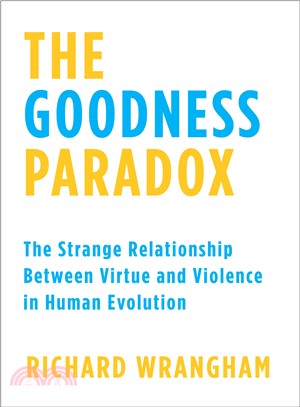目前查詢
歷史查詢

The goodness paradox :the strange relationship between virtue and violence in human evolution /
作者 : Wrangham, Richard W.,,1948-
出版社 : Pantheon Books,
出版年 : 2019
ISBN:9781101870907|9781101870914
- 館藏(1)
- 書目資訊
- 心得(0)
- 機讀格式
- 標籤
書名 : The goodness paradox :the strange relationship between virtue and violence in human evolution /
紀錄類型 : 書目-語言資料,印刷品: 單行本
正題名[資料類型標示]/作者 : The goodness paradox :Richard Wrangham.
其他題名 : the strange relationship between virtue and violence in human evolution /
作者 : Wrangham, Richard W.,
版本項 : 1st ed.
出版者 : New York :Pantheon Books,c2019.
面頁冊數 : x, 377 p. ;25 cm.
內容註 : Introduction: virtue and violence in human evolution -- The paradox -- Two types of aggression -- Human domestication -- Breeding peace -- Wild domesticates -- Belyaev's rule in human evolution -- The execution hypothesis -- Capital punishment -- What domestication did -- The evolution of right and wrong -- Proactive aggression -- War -- Chimera.
標題 : Aggressiveness.
ISBN : 9781101870907 (hbk.) :
LEADER 02457cam 2200229 a 4500
001 982177
005 20190208073642.0
008 191104s2019 nyu g b 001 0 eng c
010 $a2018028837
020 $a9781101870907 (hbk.) :$cUSD28.95
020 $z9781101870914 (ebook)
035 $a20701755
040 $aLBSOR/DLC$beng$cLBSOR$dDLC$dTWTNM
042 $apcc
050 00$aGN281.4$b.W73 2019
082 00$a155.9$223
100 1 $aWrangham, Richard W.,$d1948-
245 14$aThe goodness paradox :$bthe strange relationship between virtue and violence in human evolution /$cRichard Wrangham.
250 $a1st ed.
260 $aNew York :$bPantheon Books,$cc2019.
300 $ax, 377 p. ;$c25 cm.
504 $aIncludes bibliographical references and index.
505 0 $aIntroduction: virtue and violence in human evolution -- The paradox -- Two types of aggression -- Human domestication -- Breeding peace -- Wild domesticates -- Belyaev's rule in human evolution -- The execution hypothesis -- Capital punishment -- What domestication did -- The evolution of right and wrong -- Proactive aggression -- War -- Chimera.
520 $a"Highly accessible, authoritative, and intellectually provocative, a startlingly original theory of how Homo sapiens came to be: Richard Wrangham forcefully argues that, a quarter of a million years ago, rising intelligence among our ancestors led to a unique new ability with unexpected consequences: our ancestors invented socially sanctioned capital punishment, facilitating domestication, increased cooperation, the accumulation of culture, and ultimately the rise of civilization itself. Throughout history even as quotidian life has exhibited calm and tolerance war has never been far away, and even within societies violence can be a threat. The Goodness Paradox gives a new and powerful argument for how and why this uncanny combination of peacefulness and violence crystallized after our ancestors acquired language in Africa a quarter of a million years ago. Words allowed the sharing of intentions that enabled men effectively to coordinate their actions. Verbal conspiracies paved the way for planned conflicts and, most importantly, for the uniquely human act of capital punishment. The victims of capital punishment tended to be aggressive men, and as their genes waned, our ancestors became tamer. This ancient form of systemic violence was critical, not only encouraging cooperation in peace and war and in culture, but also for making us who we are: Homo sapiens"--$cProvided by publisher.
650 0$aAggressiveness.
650 0$aHuman behavior.
650 0$aHuman evolution.
